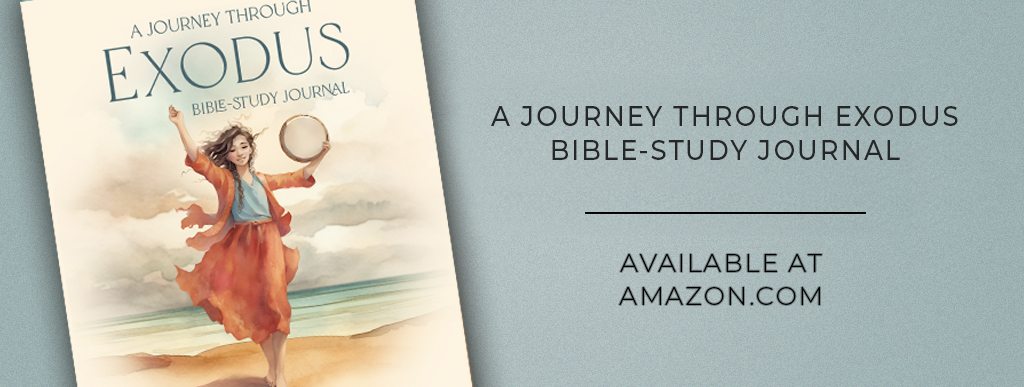Exodus Bible Study – Chapters 6-10
Are you looking for the other posts in this study? Click here for the table of contents.

This Week’s Reading Schedule:
Monday – Exodus 6
Tuesday – Exodus 7
Wednesday – Exodus 8
Thursday – Exodus 9
Friday – Exodus 10

My Thoughts on Exodus Chapters 6-10
Exodus Chapter 6
In chapter six, we see God reveal Himself to His people as Jehovah. It would seem as though this name was new to them, but in fact, it was frequently used in the book of Genesis where it’s often translated as “Lord.”
Jehovah, “Yĕhovah” means “the existing one.”
Here’s where it gets interesting. The root word, “hayah” means “to happen, fall out, occur, take place, come about, come to pass.”
So there was much more to God’s name than His existence, there was a promise of something yet to come.
By revealing Himself as Jehovah, He was signifying to His people that the hope of the promise was near. Again, this was important to them since the promise of becoming a mighty nation was passed down for hundreds of years.
He goes on to reaffirm the promises of making them a strong nation, redeeming them from the bondage of slavery, and giving them the land of Canaan.
Isn’t it amazing to see how these promises parallel the covenant between Jesus Christ and His church? They were God’s people, as we too are God’s people, when we believe in Jesus Christ. He has redeemed His people with a mighty hand through His death on the cross, and finally, He is preparing a home for us according to the promises He made.
“Let not your heart be troubled: ye believe in God, believe also in me. In my Father’s house are many mansions: if it were not so, I would have told you. I go to prepare a place for you. And if I go and prepare a place for you, I will come again, and receive you unto myself; that where I am, there ye may be also.” – John 14:1-3
Be careful that you don’t fall into the same mindset that the Israelites did, when “they hearkened not unto Moses for anguish of spirit, and for cruel bondage.” (Exodus 6:9)
When following Christ gets difficult, or when you start losing faith look ahead to the promise with hope.
Exodus Chapter 7
When I read Exodus through the first time, I was kind of stumped on chapter seven verse one, “And the Lord said unto Moses, See, I have made thee a god to Pharaoh: and Aaron thy brother shall be thy prophet.”
When I read it through again, I found the answer in chapter four, verse 16, “And he [Aaron] shall be thy spokesman unto the people: and he shall be, even he shall be to thee instead of a mouth, and thou shalt be to him instead of God.” And so we see that God was affirming that Moses would be the mediator. He would be God’s instrument of power over Pharaoh and to the Hebrews, while Aaron would be his voice.
This chapter is a pivotal point in the Exodus story. From here we start to see the 10 plagues of Egypt unfold, proving the sovereignty and the authority of God. Over the years, the Egyptians worshipped hundreds of false gods. These gods would soon be minimized by the demonstration of God’s supreme power over the earth.
Wikipedia states, “The beings in ancient Egyptian tradition who might be labeled as deities are difficult to count. Egyptian texts list the names of many deities whose nature is unknown and make vague, indirect references to other gods who are not even named. The Egyptologist James P. Allen estimates that more than 1,400 deities are named in Egyptian texts, whereas his colleague Christian Leitz says there are “thousands upon thousands” of gods.” (Wikipedia: Ancient Egyptian Deities).
As we are going through them, however, we can definitely spot some of them such Hapi, the god of the Nile. I was studying the Nile River earlier in this study and I remember reading how the Egyptians would walk along the banks of the river and spread seeds on the river banks. Every year, the banks of the river would flood, it would moisten the soil, and the seeds would bring forth a harvest. Of course, they attributed this annual flood to the god of the Nile, Hapi, which is a slap in the face to the goodness of God.
I won’t tell you the others since I want you to consider them as you’re working your way through this study, but I will tell you that there’s a list of Egyptian deities you can refer to on Wikipedia. It’s a really interesting read. Here’s a link:
List of Egyptian Deities (Wikipedia)
Exodus Chapter 8
In Exodus chapter 8 we see God unleashing three more plagues: frogs, lice, and flies. Like many false believers, Pharaoh only turned to God when he wanted relief from his pain. Each time God removed a plague, Pharaoh hardened his heart yet again, refusing to let the people go.
Heket was known to the ancient Egyptians as the goddess of fertility, and in fact, had the head of a frog. An abundance of frogs would often appear before the yearly flooding of the Nile, which they attributed to Heket. An abundance of frogs was one thing, but an overabundance of frogs wreaked havoc on the city as they entered the homes and the fields to find moisture and warmth. When the frogs died, the city stunk, which was God’s way of displaying His supremacy over their false god.
Geb (also known as Seb) was the ancient Egyptian “god of the earth.“ After reading several commentaries, I wondered why people connected Geb to the plague of lice. They seemed disconnected, but then I saw it–God used the very dust of the earth that they worshipped to bring about the plague of lice. It’s interesting and sad to note that the magicians recognized this plague as the finger of God, but that recognition of power further angered Pharaoh instead of bringing him to repentance.
And finally, in this chapter, we read about the plague of the flies. As I was reading through the scripture, I started to notice that everywhere the word “flies” appeared, it was in italics, so I went to the Blueletter Bible (blueletterbible.org) to see what the original Hebrew context was. I couldn’t find the word “flies” there either, but we do know that there were swarms of these insects in Pharaoh’s home. “And the Lord did so; and there came a grievous swarm of flies into the house of Pharaoh, and into his servants’ houses, and into all the land of Egypt: the land was corrupted by reason of the swarm of flies.” (v. 24)
Many scholars believe that this plague was designed to mock the famous insect god, Khepri. Khepri had the face of a beetle and was connected with the sunrise, rebirth, and creation.
Exodus Chapter 9
Reading through chapter nine, studying plague after plague, I got wondering—why did God let this continue? Why didn’t He just free the people in the first place instead of having Moses ask Pharaoh for his permission again and again? If God could turn water to blood, certainly He could turn Pharaoh to dust. In fact, He could have prevented Pharaoh from being born in the first place. The answer is found in verse 16 of this chapter:
“And in very deed for this cause have I raised thee up, for to shew in thee my power; and that my name may be declared throughout all the earth.” Exodus 9:16
Pharaoh was brought into this world for a reason, he was raised for a purpose, and he was given an opportunity to harden his heart so that through his disobedience God would prove Himself to both His people and to the rest of the world.
God’s sovereignty and power was revealed through each and every one of the plagues. There wasn’t a stone left unturned. Every detail of the Exodus, including the many times that Pharaoh hardened his heart, was composed for a reason.
God knew Pharaoh before he was born. He knew what made him tick. He knew that Pharaoh was proud and that pride was the very thing that would cause him to harden his heart. He knew Pharaoh better than Pharaoh knew himself, and so He used Pharaoh’s weakness to make His power known to the world.
God sent Moses to warn Pharaoh of the upcoming plagues, but each time he did, Pharaoh turned his back on the Lord:
Verse 20 and 21 reveal Pharaoh’s heart, and also the heart of his people, “He that feared the word of the Lord among the servants of Pharaoh made his servants and his cattle flee into the houses: And he that regarded not the word of the Lord left his servants and his cattle in the field.” Exodus 9:20-21
Exodus Chapter 10
I couldn’t help but notice the question that God posed to Pharaoh in verse 3: “How long will you refuse to humble yourself before me?”
He didn’t say, how long will you refuse to obey me, but instead he cut right to the heart of the matter—Pharaoh’s pride stood in the way of obedience.
The Egyptians were starting to blame Pharaoh for this disaster. There was pressure on him from all sides, but instead of yielding to the pressure in humility, he continued to harden his heart.
He was more concerned about his pride than he was about the destruction of their land.
As we’re into chapter 10, we see God mocking their most beloved of gods. Osiris, the god of vegetation (also the giver of life) was one of their greatest (if not THE greatest) gods. According to the myth, his brother Seth killed him and dismembered his body in a struggle for power. His wife used magic to bring him back to life. Their son avenged his father thus becoming the king of Egypt, while Osiris became the king of the dead. The plague of the locust was a challenge that mocked their beloved king and his family. (http://historylists.org/…/list-of-15-most-worshiped-ancient…)
Ra the sun god, they believed, was born every morning. He was responsible for the resurrection of the pharaohs of Egypt. When darkness fell upon Egypt it remained for three days. This delay speaks volumes to me as it proved both the falsehood and death of their god, and it displayed God’s power over life. If it was merely dark for an afternoon they would have assumed that their god returned in the morning, but when morning came again, and again, and again—the darkness remained, proving their god was a lie, and that Pharaoh was indeed destructible.
Questions for each chapter are available in the study guide. When you purchase a copy of the study guide, you’re actively supporting and strengthening our ministry as we spread the empowering message of the gospel to women across the globe!

We understand that not everyone can purchase the study guide, which is why we provide a printable version exclusively for those facing financial constraints. By subscribing below, you’ll unlock access to these downloadable materials. As part of our community, you’ll have the opportunity to explore the content at your own pace. Plus, as an added treat, you’ll receive periodic devotions from Time-Warp Wife, delivered directly to your inbox. Together, we can grow in faith and discover the abundant blessings of our shared journey. Join us in spreading the empowering message of the gospel to women all around the world.
